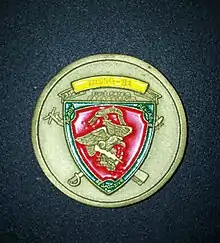Si vis pacem, para bellum
Si vis pacem, para bellum (Classical Latin: [siː wiːs ˈpaːkẽː ˈpara ˈbɛllũː]) is a Latin adage translated as "If you want peace, prepare for war".
Background
The phrase Si vis pacem, para bellum is adapted from a statement found in Latin author Publius Flavius Vegetius Renatus's tract De Re Militari (4th or 5th century AD), in which the actual phrasing is Igitur qui desiderat pacem, praeparet bellum ("Therefore let him who desires peace get ready for war.").[1][2] The idea which it conveys also appears in earlier works such as Plato's Nomoi (Laws) and the Chinese Shi Ji.[3][4][5] The phrase presents the insight that the conditions of peace are often preserved by a readiness to make war when necessitated.
Notable uses

Whatever the source, the adage has become a living vocabulary item itself, used in the production of different ideas in a number of languages.
Si vis bellum para pacem
For example, historian Louis Antoine Fauvelet de Bourrienne made reference to the foreign policy of Napoleon Bonaparte:[6]
- Everyone knows the adage... Had Bonaparte been a Latin scholar he would probably have reversed it and said, Si vis bellum para pacem.
In other words, a leader who is planning a war should put other nations off guard by cultivating peace. Conversely, another interpretation could be that preparing for peace may lead another party to wage war.
Si vis pacem para pactum
In the United States, the National Arbitration and Peace Congress of 1907, presided over by Andrew Carnegie said:
- These vast armaments on land and water are being defended as a means, not to wage war, but to prevent war… there is a safer way … it requires only the consent and the good-will of the governments. Today they say … If you want peace, prepare for war. This Congress says in behalf of the people: Si vis pacem, para pactum, if you want peace, agree to keep the peace.[7]
Si vis pacem fac bellum
"If you want peace, make war". The solution does not cover the case of the nation that does not desire peace. Imperial Germany went to war in 1914 and was castigated by Richard Grelling, a German-Jewish pacifist, in J'Accuse (1915). In 1918 Grelling wrote again, this time as an expatriate in Switzerland. Citing Woodrow Wilson's "The world must be safe for democracy" speech before Congress on April 2, 1917, Grelling says:[8]
- When all other means fail, ... the liberation of the world from military domination can in the extreme case only take place by battle. ... in place of si vis pacem para bellum a similarly sounding principle ... may become a necessity: Si vis pacem, fac bellum.
Si vis pacem para pacem
"If you want peace, prepare for peace." The great wars of the 19th and 20th centuries were opposed by the philosophy of pacifism, which in the 19th century was associated with early socialism, even though the socialism of the 20th century often lacked pacifistic tendencies, preaching violent revolution instead. The pacifism that opposed the world wars traced its lineage to Barthélemy Prosper Enfantin, an early French socialist and one of the founders of Saint-Simonianism. As early as April 2, 1841, he had said in a letter to General Saint-Cyr Nugues:[9]
- Le fameux dicton ... me semble beaucoup moins vrai, pour le XIXe siècle, que Si vis pacem, para pacem.
- The famous dictum ... seems to me much less true, for the 19th century, than Si vis pacem, para pacem.
with reference to Algeria. By way of elucidation Enfantin goes on to say that war could have been avoided if a proper study of Algeria had been made.
The parabellum

The main clause of the adage was used as a motto by German arms maker Deutsche Waffen und Munitionsfabriken (DWM), and is the source of the term Parabellum as applied to firearms and ammunition[10][11] (especially the 9mm Parabellum cartridge). The term is an opposed parallel to the American use of "peacemaker" to mean the Colt Single Action Army handgun.
Mottos

Various military organizations use or used this phrase as a motto:
- The Royal Navy
- The Norwegian Military Academy
- The Lohatla Army Battle School, South Africa
- RAF Spadeadam
- The 4th Company, 1-12th Mech. Bde, Szczecin - Poland
- The Weaponry Fund of the Republic of Lithuania Under the Ministry of the Interior of the Republic of Lithuania[12]
- Various United States military units:
- MSSG-31 (now known as CLB-31), part of the 31st Marine Expeditionary Unit, III Marine Expeditionary Force, based out of Okinawa, Japan.
- Alpha Company of the United States Marine Corps School of Infantry (SOI) - West, based out of Camp Pendleton, California.
- 10th and 319th Missile Squadrons
- US Navy Destroyer Squadron 1 Commodore
- The United States Naval Academy class of 1996
- The 96th Communication Squadron, based at Eglin AFB
- The 414th Infantry Regiment, based at Joint Base Lewis-McChord
- The 302nd Security Forces Squadron, Peterson AFB, Colorado
- The 24th Marine Regiment
- The 155th Air Refueling Wing Nebraska Air National Guard Logistics Readiness Squadron, Nebraska
- The Naval Reserve Officers Training Corps (NROTC) Chicago (consists of University of Illinois at Chicago and Illinois Institute of Technology).
- The Electronic Attack Squadron 139, NAS Whidbey Island, Washington
- The Drug Enforcement Administration Basic Agent Class 197 Quantico
- Echo Battery 2d Bn/10th Marine Artillery Regiment, 2d MARDIV Marine Corps Base Camp Lejeune, North Carolina
- The 57th Munitions Squadron, based at Nellis AFB, NV
- The Spartans of B-CO 3-47, Fort Benning, GA
- The United States Naval Academy Class of 2021
- The United States Space Force's Space Training and Readiness Delta (Provisional)
In popular culture
- The 2019 film, John Wick: Chapter 3 – Parabellum, features the line spoken by Winston during the battle at the Continental, with the translation of it appearing as a subtitle. The title of the film also takes inspiration from the line.
- The Metallica song Don't Tread On Me, from their Self Titled “Black” album features the line “To secure peace is, to prepare for war”.
- The title of a 1971 pamphlet by The Angry Brigade
- "If You Want Peace... Prepare For War" is the title of a Children of Bodom song from their 2006 album Are You Dead Yet?
- The motto of The European Federation's Enforcer Corps in Ubisoft's, Tom Clancy's EndWar
- The design for several T-shirts of WWE wrestler Triple H
- The title of the eighth episode of the first season of the television show Star Trek: Discovery
- "If you want peace, prepare for war" is repeated in the chorus of "Cenotaph" from the album "Equals" by The Alarm.
- "Operation: Para Bellum" is a downloadable content in the video game Tom Clancy's Rainbow Six Siege from Ubisoft.
- Used by Captain Renard in the episode Cat and Mouse (Grimm) of the television series Grimm.
- The line is mentioned in the Season 1 episode "Bart the Genius" of the television series The Simpsons when Bart's intelligence-gifted class talk about paradoxes.
- Used by Frank Castle in the final issue of Punisher: Year One, and during a scene of The Punisher; both times, Castle states he learned the motto at the training camp (Marine Corps in the first case, Special Forces in the second), and both times he's using the phrase to justify his aggressive proactive war against crime.
- Used by Agent Liberty in the episode American Alien of the television series Supergirl
- The first line of the Knight ram chant heard in the Breach (Castle Siege) mode in the game For Honor
- A Japanese web novel, Modern Weapons Cheat in Another World, uses the name Parabellum as a military state’s name.
- In the 2016 film, Suicide Squad, the line appears on clothing in a store display when Harley Quinn breaks a window to steal a purse.
- The line also appears on the artwork for the 2020 single, "Dangerous" from the South African band Seether. As well as, being the name and title track for their 2020 album.
- The Ernest Cline novel "Armada" uses the motto for the "Earth Defence Alliance"
- The Line Parabellum is the title of year 3, season 2 in Ubisoft's Tom Clancy's Rainbow Six Siege
- Used by the St Croix County (Wisconsin) Republican website during the days of the insurrection at the Washington D.C. capital.
See also
References
- Vegetius Renatus, Flavius. "Epitoma Rei Militaris [Book 3]" (in Latin). The Latin Library.
- Renatus, Flavius Vegetius; Végèce (1996). Vegetius: epitome of military science - Google Books. ISBN 9780853239109. Retrieved 2011-03-13.
- Plato, Laws, 1.628c9–e1.
- Martin Ostwald, Language and History in Ancient Greek Culture (2009), p. 87.
- "Records of the Grand Historian, ch. 47".
- De Bourrienne, p. 418.
- Bertholdt, p. 333
- Grelling, p. 208.
- de Saint-Simon, Enfantin, p. 34.
- Arnold, David W. (2011) [2004]. "The German P08 Luger". Classic Handguns of the 20th Century. Gun Digest Books. p. 18. ISBN 9781440226403. OCLC 774392892. Retrieved 2013-06-27.
- Kimmerle, Erin H.; Baraybar, Jose Pablo (2008). Skeletal Trauma: Identification of Injuries Resulting from Human Rights Abuse and Armed Conflict. CRC Press. p. 396. ISBN 9781420009118. OCLC 850253284. Retrieved 2013-06-27.
- "Lietuvos Respublikos ginklų fondas". Lgf.lt. Retrieved 2011-03-13.
Further reading
- Bartholdt, Richard (1907). "The Interparliamentary Plan". In Ely, Robert Erskine (ed.). Proceedings of the National Arbitration and Peace Congress New York, April 14th to 17th, 1907. New York: The National Arbitration and Peace Congress.. Downloadable Google Books.
- De Bourrienne, Louis Antoine Fauvelet (1895). Phipps, R.W. (ed.). Memoirs of Napoleon Bonaparte: New and Revised Edition: with Numerous Illustrations: Vol I. New York: Charles Scribner's Sons.
- Duff, Mountstuart Elphinstone Grant (1899). Notes from a Diary, Kept Chiefly in Southern India, 1881-1886: Vol. II. London: J. Murray. p. 28.
- Grelling, Richard (1918). The Crime. Gray, Sir Alexander (trans.). New York: George H. Doran Company. ISBN 0-665-84477-8.
- Claude-Henri de Saint-Simon, Barthélémy Prosper Enfantin (1873). Œuvres d'Enfantin: Quatorzième Volume; Membres du Conseil Institué par Enfantin pour l'Exécution de ses Dernières Volontés. Paris: E. Dentu, Éditeur.
External links
 Media related to Si vis pacem, para bellum at Wikimedia Commons
Media related to Si vis pacem, para bellum at Wikimedia Commons
_02.jpg.webp)